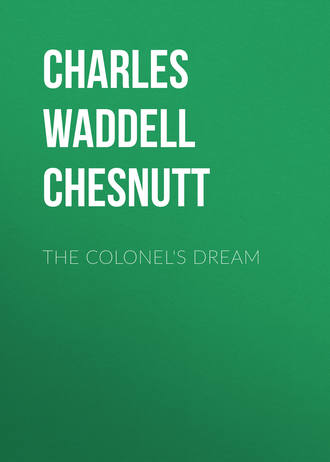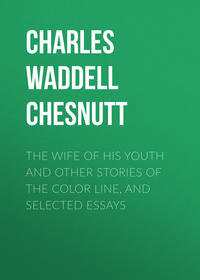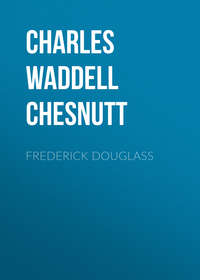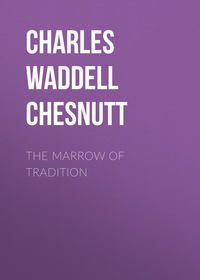 полная версия
полная версияThe Colonel's Dream
The suggestion of a house warming had come originally from Mrs. Treadwell; but Graciella had promptly made it her own and conveyed it to the colonel.
"A bright idea," he replied. "By all means let it be an old-time party—say such a party as my father would have given, or my grandfather. And shall we invite the old people?"
"Well," replied Graciella judicially, "don't have them so old that they can't talk or hear, and must be fed with a spoon. If there were too many old, or not enough young people, I shouldn't enjoy myself."
"I suppose I seem awfully old to you," said the colonel, parenthetically.
"Oh, I don't know," replied Graciella, giving him a frankly critical look. "When you first came I thought you were rather old—you see, you are older than Aunt Laura; but you seem to have grown younger—it's curious, but it's true—and now I hardly think of you as old at all."
The colonel was secretly flattered. The wisest man over forty likes to be thought young.
"Very well," he said, "you shall select the guests."
"At an old-time party," continued Graciella, thoughtfully, "the guests should wear old-time clothes. In grandmother's time the ladies wore long flowing sleeves–"
"And hoopskirts," said the colonel.
"And their hair down over their ears."
"Or in ringlets."
"Yes, it is all in grandmother's bound volume of The Ladies' Book," said Graciella. "I was reading it only last week."
"My mother took it," returned the colonel.
"Then you must have read 'Letters from a Pastry Cook,' by N.P. Willis when they came out?"
"No," said the colonel with a sigh, "I missed that. I—I wasn't able to read then."
Graciella indulged in a brief mental calculation.
"Why, of course not," she laughed, "you weren't even born when they came out! But they're fine; I'll lend you our copy. You must ask all the girls to dress as their mothers and grandmothers used to dress. Make the requirement elastic, because some of them may not have just the things for one particular period. I'm all right. We have a cedar chest in the attic, full of old things. Won't I look funny in a hoop skirt?"
"You'll look charming in anything," said the colonel.
It was a pleasure to pay Graciella compliments, she so frankly enjoyed them; and the colonel loved to make others happy. In his New York firm Mr. French was always ready to consider a request for an advance of salary; Kirby had often been obliged to play the wicked partner in order to keep expenses down to a normal level. At parties débutantes had always expected Mr. French to say something pleasant to them, and had rarely been disappointed.
The subject of the party was resumed next day at Mrs. Treadwell's, where the colonel went in the afternoon to call.
"An old-time party," declared the colonel, "should have old-time amusements. We must have a fiddler, a black fiddler, to play quadrilles and the Virginia Reel."
"I don't know where you'll find one," said Miss Laura.
"I'll ask Peter," replied the colonel. "He ought to know."
Peter was in the yard with Phil.
"Lawd, Mars Henry!" said Peter, "fiddlers is mighty sca'ce dese days, but I reckon ole 'Poleon Campbell kin make you shake yo' feet yit, ef Ole Man Rheumatiz ain' ketched holt er 'im too tight."
"And I will play a minuet on your new piano," said Miss Laura, "and teach the girls beforehand how to dance it. There should be cards for those who do not dance."
So the party was arranged. Miss Laura, Graciella and the colonel made out the list of guests. The invitations were duly sent out for an old-time party, with old-time costumes—any period between 1830 and 1860 permissible—and old-time entertainment.
The announcement created some excitement in social circles, and, like all of Colonel French's enterprises at that happy period of his home-coming, brought prosperity in its train. Dressmakers were kept busy making and altering costumes for the ladies. Old Archie Christmas, the mulatto tailor, sole survivor of a once flourishing craft—Mr. Cohen's Universal Emporium supplied the general public with ready-made clothing, and, twice a year, the travelling salesman of a New York tailoring firm visited Clarendon with samples of suitings, and took orders and measurements—old Archie Christmas, who had not made a full suit of clothes for years, was able, by making and altering men's garments for the colonel's party, to earn enough to keep himself alive for another twelve months. Old Peter was at Archie's shop one day, and they were talking about old times—good old times—for to old men old times are always good times, though history may tell another tale.
"Yo' boss is a godsen' ter dis town," declared old Archie, "he sho' is. De w'ite folks says de young niggers is triflin' 'cause dey don' larn how to do nothin'. But what is dere fer 'em to do? I kin 'member when dis town was full er black an' yaller carpenters an' 'j'iners, blacksmiths, wagon makers, shoemakers, tinners, saddlers an' cab'net makers. Now all de fu'nicher, de shoes, de wagons, de buggies, de tinware, de hoss shoes, de nails to fasten 'em on wid—yas, an' fo' de Lawd! even de clothes dat folks wears on dere backs, is made at de Norf, an' dere ain' nothin' lef' fer de ole niggers ter do, let 'lone de young ones. Yo' boss is de right kin'; I hopes he'll stay 'roun' here till you an' me dies."
"I hopes wid you," said Peter fervently, "I sho' does! Yas indeed I does."
Peter was entirely sincere. Never in his life had he worn such good clothes, eaten such good food, or led so easy a life as in the colonel's service. Even the old times paled by comparison with this new golden age; and the long years of poverty and hard luck that stretched behind him seemed to the old man like a distant and unpleasant dream.
The party came off at the appointed time, and was a distinct success. Graciella had made a raid on the cedar chest, and shone resplendent in crinoline, curls, and a patterned muslin. Together with Miss Laura and Ben Dudley, who had come in from Mink Run for the party, she was among the first to arrive. Miss Laura's costume, which belonged to an earlier date, was in keeping with her quiet dignity. Ben wore a suit of his uncle's, which the care of old Aunt Viney had preserved wonderfully well from moth and dust through the years. The men wore stocks and neckcloths, bell-bottomed trousers with straps under their shoes, and frock coats very full at the top and buttoned tightly at the waist. Old Peter, in a long blue coat with brass buttons, acted as butler, helped by a young Negro who did the heavy work. Miss Laura's servant Catherine had rallied from her usual gloom and begged the privilege of acting as lady's maid. 'Poleon Campbell, an old-time Negro fiddler, whom Peter had resurrected from some obscure cabin, oiled his rheumatic joints, tuned his fiddle and rosined his bow, and under the inspiration of good food and drink and liberal wage, played through his whole repertory, which included such ancient favourites as, "Fishers' Hornpipe," "Soldiers' Joy," "Chicken in the Bread-tray," and the "Campbells are Coming." Miss Laura played a minuet, which the young people danced. Major McLean danced the highland fling, and some of the ladies sang old-time songs, and war lyrics, which stirred the heart and moistened the eyes.
Little Phil, in a child's costume of 1840, copied from The Ladies' Book, was petted and made much of for several hours, until he became sleepy and was put to bed.
"Graciella," said the colonel to his young friend, during the evening, "our party is a great success. It was your idea. When it is all over, I want to make you a present in token of my gratitude. You shall select it yourself; it shall be whatever you say."
Graciella was very much elated at this mark of the colonel's friendship. She did not dream of declining the proffered token, and during the next dance her mind was busily occupied with the question of what it should be—a ring, a bracelet, a bicycle, a set of books? She needed a dozen things, and would have liked to possess a dozen others.
She had not yet decided, when Ben came up to claim her for a dance. On his appearance, she was struck by a sudden idea. Colonel French was a man of affairs. In New York he must have a wide circle of influential acquaintances. Old Mr. Dudley was in failing health; he might die at any time, and Ben would then be free to seek employment away from Clarendon. What better place for him than New York? With a position there, he would be able to marry her, and take her there to live.
This, she decided, should be her request of the colonel—that he should help her lover to a place in New York.
Her conclusion was really magnanimous. She might profit by it in the end, but Ben would be the first beneficiary. It was an act of self-denial, for she was giving up a definite and certain good for a future contingency.
She was therefore in a pleasant glow of self-congratulatory mood when she accidentally overheard a conversation not intended for her ears. She had run out to the dining-room to speak to the housekeeper about the refreshments, and was returning through the hall, when she stopped for a moment to look into the library, where those who did not care to dance were playing cards.
Beyond the door, with their backs turned toward her, sat two ladies engaged in conversation. One was a widow, a well-known gossip, and the other a wife known to be unhappily married. They were no longer young, and their views were marked by the cynicism of seasoned experience.
"Oh, there's no doubt about it," said the widow. "He came down here to find a wife. He tried a Yankee wife, and didn't like the breed; and when he was ready for number two, he came back South."
"He showed good taste," said the other.
"That depends," said the widow, "upon whom he chooses. He can probably have his pick."
"No doubt," rejoined the married lady, with a touch of sarcasm, which the widow, who was still under forty, chose to ignore.
"I wonder which is it?" said the widow. "I suppose it's Laura; he spends a great deal of time there, and she's devoted to his little boy, or pretends to be."
"Don't fool yourself," replied the other earnestly, and not without a subdued pleasure in disabusing the widow's mind. "Don't fool yourself, my dear. A man of his age doesn't marry a woman of Laura Treadwell's. Believe me, it's the little one."
"But she has a beau. There's that tall nephew of old Mr. Dudley's. He's been hanging around her for a year or two. He looks very handsome to-night."
"Ah, well, she'll dispose of him fast enough when the time comes. He's only a poor stick, the last of a good stock run to seed. Why, she's been pointedly setting her cap at the colonel all the evening. He's perfectly infatuated; he has danced with her three times to once with Laura."
"It's sad to see a man make a fool of himself," sighed the widow, who was not without some remnants of beauty and a heart still warm and willing. "Children are very forward nowadays."
"There's no fool like an old fool, my dear," replied the other with the cheerful philosophy of the miserable who love company. "These fair women are always selfish and calculating; and she's a bold piece. My husband says Colonel French is worth at least a million. A young wife, who understands her business, could get anything from him that money can buy."
"What a pity, my dear," said the widow, with a spice of malice, seeing her own opportunity, "what a pity that you were older than your husband! Well, it will be fortunate for the child if she marries an old man, for beauty of her type fades early."
Old 'Poleon's fiddle, to which one of the guests was improvising an accompaniment on the colonel's new piano, had struck up "Camptown Races," and the rollicking lilt of the chorus was resounding through the house.
"Gwine ter run all night,Gwine ter run all day,I'll bet my money on de bobtail nag,Oh, who's gwine ter bet on de bay?"Ben ran out into the hall. Graciella had changed her position and was sitting alone, perturbed in mind.
"Come on, Graciella, let's get into the Virginia reel; it's the last one."
Graciella obeyed mechanically. Ben, on the contrary, was unusually animated. He had enjoyed the party better than any he had ever attended. He had not been at many.
Colonel French, who had entered with zest into the spirit of the occasion, participated in the reel. Every time Graciella touched his hand, it was with the consciousness of a new element in their relations. Until then her friendship for Colonel French had been perfectly ingenuous. She had liked him because he was interesting, and good to her in a friendly way. Now she realised that he was a millionaire, eligible for marriage, from whom a young wife, if she understood her business, might secure the gratification of every wish.
The serpent had entered Eden. Graciella had been tendered the apple. She must choose now whether she would eat.
When the party broke up, the colonel was congratulated on every hand. He had not only given his guests a delightful evening. He had restored an ancient landmark; had recalled, to a people whose life lay mostly in the past, the glory of days gone by, and proved his loyalty to their cherished traditions.
Ben Dudley walked home with Graciella. Miss Laura went ahead of them with Catherine, who was cheerful in the possession of a substantial reward for her services.
"You're not sayin' much to-night," said Ben to his sweetheart, as they walked along under the trees.
Graciella did not respond.
"You're not sayin' much to-night," he repeated.
"Yes," returned Graciella abstractedly, "it was a lovely party!"
Ben said no more. The house warming had also given him food for thought. He had noticed the colonel's attentions to Graciella, and had heard them remarked upon. Colonel French was more than old enough to be Graciella's father; but he was rich. Graciella was poor and ambitious. Ben's only assets were youth and hope, and priority in the field his only claim.
Miss Laura and Catherine had gone in, and when the young people came to the gate, the light still shone through the open door.
"Graciella," he said, taking her hand in his as they stood a moment, "will you marry me?"
"Still harping on the same old string," she said, withdrawing her hand. "I'm tired now, Ben, too tired to talk foolishness."
"Very well, I'll save it for next time. Good night, sweetheart."
She had closed the gate between them. He leaned over it to kiss her, but she evaded his caress and ran lightly up the steps.
"Good night, Ben," she called.
"Good night, sweetheart," he replied, with a pang of foreboding.
In after years, when the colonel looked back upon his residence in Clarendon, this seemed to him the golden moment. There were other times that stirred deeper emotions—the lust of battle, the joy of victory, the chagrin of defeat—moments that tried his soul with tests almost too hard. But, thus far, his new career in Clarendon had been one of pleasant experiences only, and this unclouded hour was its fitting crown.
Twelve
Whenever the colonel visited the cemetery, or took a walk in that pleasant quarter of the town, he had to cross the bridge from which was visible the site of the old Eureka cotton mill of his boyhood, and it was not difficult to recall that it had been, before the War, a busy hive of industry. On a narrow and obscure street, little more than an alley, behind the cemetery, there were still several crumbling tenements, built for the mill operatives, but now occupied by a handful of abjectly poor whites, who kept body and soul together through the doubtful mercy of God and a small weekly dole from the poormaster. The mill pond, while not wide-spreading, had extended back some distance between the sloping banks, and had furnished swimming holes, fishing holes, and what was more to the point at present, a very fine head of water, which, as it struck the colonel more forcibly each time he saw it, offered an opportunity that the town could ill afford to waste. Shrewd minds in the cotton industry had long ago conceived the idea that the South, by reason of its nearness to the source of raw material, its abundant water power, and its cheaper labour, partly due to the smaller cost of living in a mild climate, and the absence of labour agitation, was destined in time to rival and perhaps displace New England in cotton manufacturing. Many Southern mills were already in successful operation. But from lack of capital, or lack of enterprise, nothing of the kind had ever been undertaken in Clarendon although the town was the centre of a cotton-raising district, and there was a mill in an adjoining county. Men who owned land mortgaged it for money to raise cotton; men who rented land from others mortgaged their crops for the same purpose.
It was easy to borrow money in Clarendon—on adequate security—at ten per cent., and Mr. Fetters, the magnate of the county, was always ready, the colonel had learned, to accommodate the needy who could give such security. He had also discovered that Fetters was acquiring the greater part of the land. Many a farmer imagined that he owned a farm, when he was, actually, merely a tenant of Fetters. Occasionally Fetters foreclosed a mortgage, when there was plainly no more to be had from it, and bought in the land, which he added to his own holdings in fee. But as a rule, he found it more profitable to let the borrower retain possession and pay the interest as nearly as he could; the estate would ultimately be good for the debt, if the debtor did not live too long—worry might be counted upon to shorten his days—and the loan, with interest, could be more conveniently collected at his death. To bankrupt an estate was less personal than to break an individual; and widows, and orphans still in their minority, did not vote and knew little about business methods.
To a man of action, like the colonel, the frequent contemplation of the unused water power, which might so easily be harnessed to the car of progress, gave birth, in time, to a wish to see it thus utilised, and the further wish to stir to labour the idle inhabitants of the neighbourhood. In all work the shiftless methods of an older generation still survived. No one could do anything in a quarter of an hour. Nearly all tasks were done by Negroes who had forgotten how to work, or by white people who had never learned. But the colonel had already seen the reviving effect of a little money, directed by a little energy. And so he planned to build a new and larger cotton mill where the old had stood; to shake up this lethargic community; to put its people to work, and to teach them habits of industry, efficiency and thrift. This, he imagined, would be pleasant occupation for his vacation, as well as a true missionary enterprise—a contribution to human progress. Such a cotton mill would require only an inconsiderable portion of his capital, the body of which would be left intact for investment elsewhere; it would not interfere at all with his freedom of movement; for, once built, equipped and put in operation under a competent manager, it would no more require his personal oversight than had the New England bagging mills which his firm had conducted for so many years.
From impulse to action was, for the colonel's temperament, an easy step, and he had scarcely moved into his house, before he quietly set about investigating the title to the old mill site. It had been forfeited many years before, he found, to the State, for non-payment of taxes. There having been no demand for the property at any time since, it had never been sold, but held as a sort of lapsed asset, subject to sale, but open also, so long as it remained unsold, to redemption upon the payment of back taxes and certain fees. The amount of these was ascertained; it was considerably less than the fair value of the property, which was therefore redeemable at a profit.
The owners, however, were widely scattered, for the mill had belonged to a joint-stock company composed of a dozen or more members. Colonel French was pleasantly surprised, upon looking up certain musty public records in the court house, to find that he himself was the owner, by inheritance, of several shares of stock which had been overlooked in the sale of his father's property. Retaining the services of Judge Bullard, the leading member of the Clarendon bar, he set out quietly to secure options upon the other shares. This involved an extensive correspondence, which occupied several weeks. For it was necessary first to find, and then to deal with the scattered representatives of the former owners.
Thirteen
In engaging Judge Bullard, the colonel had merely stated to the lawyer that he thought of building a cotton-mill, but had said nothing about his broader plan. It was very likely, he recognised, that the people of Clarendon might not relish the thought that they were regarded as fit subjects for reform. He knew that they were sensitive, and quick to resent criticism. If some of them might admit, now and then, among themselves, that the town was unprogressive, or declining, there was always some extraneous reason given—the War, the carpetbaggers, the Fifteenth Amendment, the Negroes. Perhaps not one of them had ever quite realised the awful handicap of excuses under which they laboured. Effort was paralysed where failure was so easily explained.
That the condition of the town might be due to causes within itself—to the general ignorance, self-satisfaction and lack of enterprise, had occurred to only a favoured few; the younger of these had moved away, seeking a broader outlook elsewhere; while those who remained were not yet strong enough nor brave enough to break with the past and urge new standards of thought and feeling.
So the colonel kept his larger purpose to himself until a time when greater openness would serve to advance it. Thus Judge Bullard, not being able to read his client's mind, assumed very naturally that the contemplated enterprise was to be of a purely commercial nature, directed to making the most money in the shortest time.
"Some day, Colonel," he said, with this thought in mind, "you might get a few pointers by running over to Carthage and looking through the Excelsior Mills. They get more work there for less money than anywhere else in the South. Last year they declared a forty per cent. dividend. I know the superintendent, and will give you a letter of introduction, whenever you like."
The colonel bore the matter in mind, and one morning, a day or two after his party, set out by train, about eight o'clock in the morning, for Carthage, armed with a letter from the lawyer to the superintendent of the mills.
The town was only forty miles away; but a cow had been caught in a trestle across a ditch, and some time was required for the train crew to release her. Another stop was made in the middle of a swamp, to put off a light mulatto who had presumed on his complexion to ride in the white people's car. He had been successfully spotted, but had impudently refused to go into the stuffy little closet provided at the end of the car for people of his class. He was therefore given an opportunity to reflect, during a walk along the ties, upon his true relation to society. Another stop was made for a gentleman who had sent a Negro boy ahead to flag the train and notify the conductor that he would be along in fifteen or twenty minutes with a couple of lady passengers. A hot journal caused a further delay. These interruptions made it eleven o'clock, a three-hours' run, before the train reached Carthage.
The town was much smaller than Clarendon. It comprised a public square of several acres in extent, on one side of which was the railroad station, and on another the court house. One of the remaining sides was occupied by a row of shops; the fourth straggled off in various directions. The whole wore a neglected air. Bales of cotton goods were piled on the platform, apparently just unloaded from wagons standing near. Several white men and Negroes stood around and stared listlessly at the train and the few who alighted from it.
Inquiring its whereabouts from one of the bystanders, the colonel found the nearest hotel—a two-story frame structure, with a piazza across the front, extending to the street line. There was a buggy standing in front, its horse hitched to one of the piazza posts. Steps led up from the street, but one might step from the buggy to the floor of the piazza, which was without a railing.






